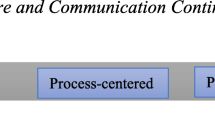Abstract
Background
Decision making in the context of palliative care is particularly complex given the unpredictable illness trajectories experienced by patients and the number of individuals who may be part of decision-making processes. This study aimed to describe the significant issues that influence the processes of care decision making, from the perspective of patients with advanced illness.
Methods
Patients (14), family members (7) and health professionals (18) were interviewed and field observations (100 h) of decision-making practices were undertaken in two Australian palliative care services. A systematic approach using grounded theory to collect and analyse the data was used to develop a theory of decision making from the patient’s perspective.
Results
The main issue experienced by palliative care patients was identified as a lack of involvement in decision making. One of the significant factors affecting the decision process is the type of relationship with health professionals that patients believe enhances their involvement in decision making. This was determined by the manner and focus of the health professional, their trustworthiness as well as the healthcare culture and environment. This paper provides a greater understanding of the perspective of patients in relation to their involvement in decisions related to palliative care.
Similar content being viewed by others
References
Beauchamp TL, Childress JF (2001) Principles of biomedical ethics, 5th ed. Oxford University Press, New York
Gawende A (1999) Whose body is it, anyway? The New Yorker, New York, pp 85–91
Taylor SG, Pickens JM, Geden EA (1989) Interactional styles of nurse practitioners and physicians regarding patient decision making. Nurs Res 38(1):50–55
O’Neill O (1984) Paternalism and partial autonomy. J Med Ethics 10:173–178
Scott PA (1999) Autonomy, power, and control in palliative care. Camb Q Healthc Ethics 8:139–147
Degner L, Kristjanson L, Bowman D, Sloan J, Carriere K, O’Neil J, Bilodeau B, Watson P, Mueller B (1997) Information needs and decisional preferences in women with breast cancer. JAMA 277(18):1485–1492
Degner L, Sloan J (1992) Decision making during serious illness: what role do patients really want to play. J Clin Epidemiol 45(9):941–950
Corbin J, Strauss A (2008) Basics of qualitative research: techniques and procedures for developing grounded theory. Sage, Los Angeles
Li S (2004) “Symbiotic niceness”: constructing a therapeutic relationship in psychosocial palliative care. Soc Sci Med 58(12):2571–2583
Street A (1995) Nursing replay: researching nursing culture together. Churchill Livingstone, Melbourne
Aranda S (2001) The tyrannies of palliative care. Int J Palliat Nurs 7(12):572–573
Kraetschmer N, Sharpe N, Urowitz S, Deber RB (2004) How does trust affect patient preference for participation in decision making. Health Expectations 7(4):317–326
Pearson SD, Raeke LH (2000) Patients’ trust in physicians: many theories, few measures, and little data. J Gen Intern Med 15(7):509–513
Davison BJ, Degner LF (1998) Promoting Patient Decision Making in Life-and-Death Situations. Semin Oncol Nurs 14(2):129–136
Acknowledgments
The researchers acknowledge the study participants and the organisations that assisted. Funding from the National Health and Medical Research Council of Australia (NHMRC) to the first and third authors is also acknowledged. Career funding support to the second author from The Cancer Council of WA is also gratefully acknowledged.
Dr. Justin Oakley, Monash University, is also acknowledged for his assistance in the design and analysis phases of the study.
Ethical Approval: obtained from Edith Cowan University in Perth, Western Australia and the clinical institutions involved in the study.
Contribution: Study design: SFL, LK;
Data collection: SFL;
Data analysis: SFL, LK, AW
Manuscript preparation: SFL, LK, AW.
Conflicts of Interest
None to declare.
Author information
Authors and Affiliations
Corresponding author
Rights and permissions
About this article
Cite this article
Lee, S.F., Kristjanson, L.J. & Williams, A.M. Professional relationships in palliative care decision making. Support Care Cancer 17, 445–450 (2009). https://doi.org/10.1007/s00520-008-0516-z
Received:
Accepted:
Published:
Issue Date:
DOI: https://doi.org/10.1007/s00520-008-0516-z




